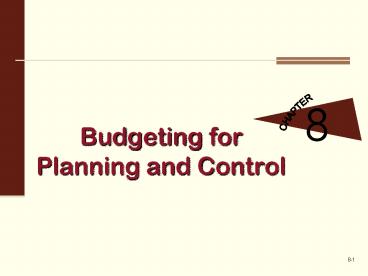Budgeting for Planning and Control - PowerPoint PPT Presentation
Title:
Budgeting for Planning and Control
Description:
8 Budgeting for Planning and Control 8-* 8-* The Role of Budgeting in Planning and Control Budgets Quantitative plans for the future Can be stated in either physical ... – PowerPoint PPT presentation
Number of Views:565
Avg rating:3.0/5.0
Title: Budgeting for Planning and Control
1
Budgeting for Planning and Control
8
CHAPTER
2
The Role of Budgeting in Planning and Control
OBJECTIVE
1
- Budgets
- Quantitative plans for the future
- Can be stated in either physical or financial
terms or both - Control
- The process of setting standards, receiving
feedback on actual performance, and taking
corrective action whenever actual performance
deviates significantly from planned performance - Budgets can be used to compare actual outcomes
with planned outcomes and they can steer
operations back on course, if necessary
3
The Role of Budgeting in Planning and Control
OBJECTIVE
1
- Purposes of Budgeting
- Forces managers to plan.
- Provides information to improve decision making.
- Aids in setting benchmarks for performance
evaluation. - Improves communication and coordination.
8-3
4
The Role of Budgeting in Planning and Control
OBJECTIVE
1
- Master Budget
- A comprehensive financial plan for the year made
up of individual department and activity budgets - Operating budgets are concerned with income
generating activities - Financial budgets are concerned with inflows and
outflows of cash and with financial position
8-4
5
The Role of Budgeting in Planning and Control
OBJECTIVE
1
- The data used to create the budget come from many
sources - The sales forecast is the basis for the sales
budget which is the basis for all of the other
operating budgets and most of the financial
budgets
6
Preparing the Operating Budget
OBJECTIVE
2
- The Operating Budget Components
- Cost of goods sold budget
- Marketing expense budget
- Research and development expense budget
- Administrative expense budget
- Budgeted Income Statement
- Sales budget
- Production budget
- Direct materials purchases budget
- Direct labor budget
- Overhead budget
- Ending finished goods inventory budget
7
Preparing the Operating Budget
OBJECTIVE
2
- Understanding Operating Budgets
- Sales Budget the projection that describes
expected sales for each product in units and
dollars. - Production Budget describes the number of units
that must be produced in order to meet sales
needs and satisfy ending inventory requirements - Basic equation Units to be produced Desired
units in ending inventory unit sales units in
beginning inventory
8
Preparing the Operating Budget
OBJECTIVE
2
- Understanding Operating Budgets
- Direct Materials Purchases Budget based on the
amount of materials needed for production and the
inventories of direct materials - Once expected usage is computed, purchases can be
computed by Purchases Desired ending inventory
of direct materials Expected usage Beginning
inventory of direct materials - Direct Labor Budget shows the total direct
labor hours and the total direct labor cost needs
for the number of units to be produced - The average wage rate should be used in the
direct labor budget.
8-8
9
Preparing the Operating Budget
OBJECTIVE
2
- Understanding Operating Budgets
- Overhead Budget shows the expected cost of all
indirect manufacturing items - Ending Finished Goods Inventory Budget supplies
information needed for the balance sheet and also
serves as an important input for the preparation
of the cost of goods sold budget - Cost of Goods Sold Budget used in preparing the
budgeted income statement - Marketing Expense Budget outlines planned
expenditures for selling and distribution
activities
8-9
10
Preparing the Operating Budget
OBJECTIVE
2
- Understanding Operating Budgets
- Administrative Expense Budget consists of
estimated expenditures for the overall
organization and operation of the company - Research and Development Expense Budget
contains planned expenditures for a separate
department devoted to new product research and
development - Budgeted Income Statement With the completion
of the above budgets, an estimate of operating
income can be completed. - Operating income is not equal to net income to
be equal, interest expense and taxes must be
subtracted from operating income.
8-10
11
The Role of Todays Cost and Management Accountant
3
OBJECTIVE
- The Controller
- The Treasurer
- Collection of cash
- Monitoring of cash payments
- Monitors cash availability
- Short-term investments
- Short and long-term borrowing
- Issuing of capital stock
- Financial reports
- SEC reporting
- Tax planning and reporting
- Performance reporting
- Internal auditing
- Budgeting
- Accounting systems and internal controls
12
The Behavioral Dimension of Budgeting
6
OBJECTIVE
- Characteristics of a Good Budgetary System
- Frequent Feedback on Performance
- Monetary and Nonmonetary Incentives
- Participative Budgeting
- Realistic Standards
- Controllability of Costs
- Multiple Measures of Performance































